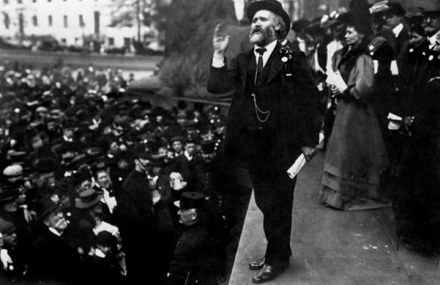
Jon Cruddas has written a book. It’s titled A Century of Labour, and it aims to trace the history of three traditions within the party – the ethical socialist tradition, the tradition that focuses on human welfare, and that which focuses on rights and liberty – over the 100 years since the first Labour government.
It also looks to use this history, going back beyond the party and to traditions coming out of the Diggers and the Chartist movement, to probe several ongoing questions about the party’s origins, purpose and future – was Labour inevitable? Is it now managing its own decline? What is the party’s mission?
As with all history books by serving politicians, one suspects any potential audience is just as, if not more, interested in what Cruddas thinks about the present as they are in what he thinks about the past.
Strident commentary on leadership of Keir Starmer
On this front, the Dagenham and Rainham MP does not disappoint: his book has quite a lot to offer in terms of strident commentary on the leadership of Keir Starmer, something about which Cruddas is un-shy about expressing reservations. The book begins with some more oblique criticisms of Starmer – that he is “elusive” and “detached” from the party’s traditions, and even, Cruddas feels, “disinterested in questions of liberty and freedom” – before opening both barrels in the closing section.
At the book’s close, Cruddas profiles Starmer as candidate and Starmer as leader. In his first incarnation, Cruddas argues, Starmer sought to fuse together the party’s traditions to become a kind of synthesis candidate who championed internal pluralism, a “tactical manoeuvre with a strategic cost”, and one perhaps destined to backfire as, the book contends, Starmer himself has little knowledge or appreciation of the ways in which they are substantively different.
Accusations that left candidates “ruthlessly excluded”
It then traces Starmer as leader (and interesting titbit: the book names Blue Labour academic Jonathan Rutherford as the author of the leader’s acceptance speech), making a series of quite familiar critiques. The organised right of the party “very closely aligned to key personnel in the leader’s office” have “ruthlessly excluded” candidates “from the left and soft left” in the current selections round and Starmer’s ten campaign pledges have been all but junked. Cruddas thinks the centrality of attempts to win back Red Wall voters does make things more complicated than the “New Labour restoration project” some view Starmerism as, however.
 That Cruddas, a senior MP retiring at the next election, has chosen to end his career in frontline politics by (repeatedly) slamming the current Labour leader says interesting things about where the Starmer project has ended up. Despite backing Lisa Nandy, this level of antagonism between Cruddas and similar figures of the soft left (Neal Lawson provides an enthusiastic back cover quote) and the leadership was far from inevitable.
That Cruddas, a senior MP retiring at the next election, has chosen to end his career in frontline politics by (repeatedly) slamming the current Labour leader says interesting things about where the Starmer project has ended up. Despite backing Lisa Nandy, this level of antagonism between Cruddas and similar figures of the soft left (Neal Lawson provides an enthusiastic back cover quote) and the leadership was far from inevitable.
It’s also interesting that Cruddas is, in this book, seemingly swerving away from the Blue Labourism he was much associated with, whose concerns get some, but not much, look-in here.
Paint-by-numbers Labour history
If the book begins and ends with robust and engaging comment on today’s Labour Party, content which I am sure would be of sincere interest to the readers of LabourList, it’s the middle where the issues are.
While the questions it looks to answer and traditions it looks to explore are interesting ones, what we actually get is an unexceptional history of the party, with occasional, tacked-on-feeling digressions about the traditions.

It’s all as you’d expect: Keir Hardie, Ramsay McDonald, first Labour government, Zinoviev letter, national government, war, Let Us Face The Future, NHS, Bevan, Gaitskell, Wilson, white heat, In Place of Strife, defeat, narrow victory, 1976 leadership race, IMF, longest suicide note in history, Kinnock, Militant, Sun wot won it, Smith, Granita, New Labour, Sure Start, Iraq, Miliband vs Miliband, OMOV, Corbyn, 2017, 2019, Starmer, 20 points ahead.
The narrative becomes more engaging in the 1980s and ’90s, going into the weeds on internal party matters more as Cruddas begins to write about things that happened in his political lifetime.
If the whole book had as much to say, or used its conceit as well, as the section contrasting the traditions inherited by Tony Benn and those inherited by Michael Foot, this would be a much less mixed review. Despite moments such as this, all the beats are familiar and the writing feels flat and repetitive, prone to using the same shorthand and quotes over and over (we get to hear about how Clement Attlee masked his radicalism in a “ribcage of tradition” twice in four pages).
This book should probably have been a pamphlet
Cruddas’s politics and instincts are ones I am basically sympathetic to; I want more MPs like him, who champion the kind of pluralism I’d like to see flourish in the party and engaged with the history of the Labour movement.
For naked factional reasons, then, I’d have preferred to write a kinder review of this book. Ultimately, however, if you put A Century of Labour through a strainer you’d come out with some angry and incisive op-eds about Starmer and a short pamphlet jointly published by Compass and the Fabians called “The Three Traditions”, and that would have been better for everyone.




More from LabourList
Welfare vote: ‘Here are the failures it reveals – and three faint silver linings’
Welfare vote: Which Labour MPs voted against bill or backed new amendment?
‘Welfare reforms still mean a climate of fear. Changes are too little, too late’